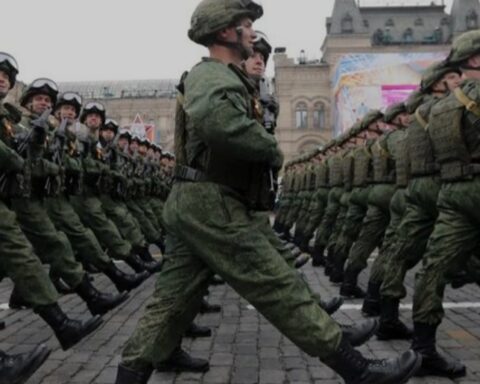A TV presenter and actress in Moscow received a 50,000-ruble ($560) fine from a court for hosting an “almost naked” party and later posting on social media calling for peace, which was deemed to discredit the military.
Anastasia Ivleeva stirred controversy in Russia with her risqué party in December, where guests were encouraged to wear minimal clothing.
Also Read:Russia reopens embassy in Burkina Faso after 30 years of closure.
Despite not appearing in court for the non-criminal case, Ivleeva was fined for two social media posts made at the start of Russia’s invasion of Ukraine.
The posts advocated for peace and negotiations but were found to violate a law against discrediting the military, even though the law was enacted after the posts were made.
One of the Instagram posts, featuring a black square with “No to war,” and another showing a dove sketch urging authorities to seek compromises to end bloodshed, led to the legal action.
Instagram is blocked in Russia, but many users access it through VPN services.
Following Russia’s invasion on February 24, 2022, the country clamped down on any dissent against what it terms a “special military operation.” Notably, opposition activist Vladimir Kara-Murza received a severe sentence of 25 years in prison for delivering a speech in the United States condemning the war.
Also Read:World Condemns Moscow Terrorist Attack
Oleg Orlov, co-chair of the Nobel Peace Prize-winning organization Memorial, was sentenced to 2 1/2 years in prison for criticism of the war. Orlov separately has been designated a “foreign agent” and was to appeal that ruling in a Thursday court hearing by videolink, but the hearing was held in a courtroom without that capability, the Mediazona news site reported.
Ivleeva became the focus of a scandal after hosting a bash at a Moscow nightclub whose invitations stated the dress code as “almost naked.” A well-known rapper showed up wearing only socks wrapped around his genitals and feet.
Photos from the party circulated widely on social media. Conservative legislators, bloggers and others then unleashed a storm of criticism, contending the images were unseemly, even unpatriotic, for a country embroiled in war.







I have not checked in here for some time since I thought it was getting boring, but the last several posts are good quality so I guess I?¦ll add you back to my daily bloglist. You deserve it my friend 🙂
I like this web blog so much, saved to my bookmarks. “I don’t care what is written about me so long as it isn’t true.” by Dorothy Parker.
you have a great blog here! would you like to make some invite posts on my blog?
Really instructive and superb structure of content material, now that’s user pleasant (:.
There may be noticeably a bundle to find out about this. I assume you made sure good factors in features also.
It is appropriate time to make some plans for the future and it’s time to be happy. I have read this post and if I could I want to suggest you some interesting things or suggestions. Maybe you could write next articles referring to this article. I wish to read even more things about it!
That is really attention-grabbing, You’re an overly skilled blogger. I’ve joined your rss feed and look ahead to looking for extra of your wonderful post. Also, I have shared your web site in my social networks!
I do agree with all the ideas you have presented in your post. They are very convincing and will certainly work. Still, the posts are very short for newbies. Could you please extend them a bit from next time? Thanks for the post.